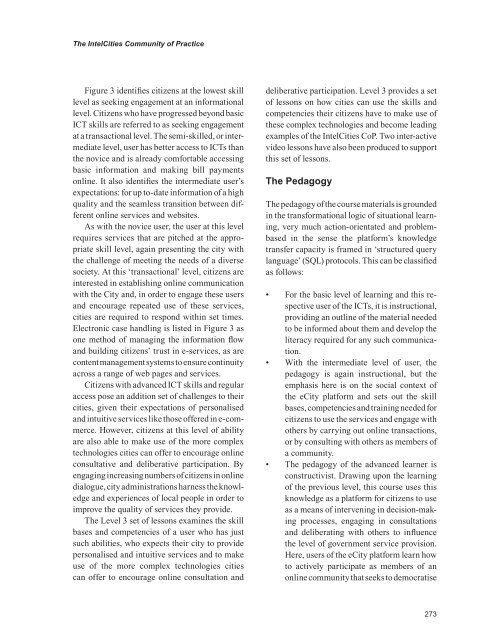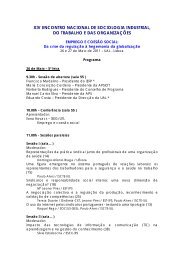Web-based Learning Solutions for Communities of Practice
Web-based Learning Solutions for Communities of Practice
Web-based Learning Solutions for Communities of Practice
Create successful ePaper yourself
Turn your PDF publications into a flip-book with our unique Google optimized e-Paper software.
The IntelCities Community <strong>of</strong> <strong>Practice</strong><br />
Figure 3 identifies citizens at the lowest skill<br />
level as seeking engagement at an in<strong>for</strong>mational<br />
level. Citizens who have progressed beyond basic<br />
ICT skills are referred to as seeking engagement<br />
at a transactional level. The semi-skilled, or intermediate<br />
level, user has better access to ICTs than<br />
the novice and is already com<strong>for</strong>table accessing<br />
basic in<strong>for</strong>mation and making bill payments<br />
online. It also identifies the intermediate user’s<br />
expectations: <strong>for</strong> up to-date in<strong>for</strong>mation <strong>of</strong> a high<br />
quality and the seamless transition between different<br />
online services and websites.<br />
As with the novice user, the user at this level<br />
requires services that are pitched at the appropriate<br />
skill level, again presenting the city with<br />
the challenge <strong>of</strong> meeting the needs <strong>of</strong> a diverse<br />
society. At this ‘transactional’ level, citizens are<br />
interested in establishing online communication<br />
with the City and, in order to engage these users<br />
and encourage repeated use <strong>of</strong> these services,<br />
cities are required to respond within set times.<br />
Electronic case handling is listed in Figure 3 as<br />
one method <strong>of</strong> managing the in<strong>for</strong>mation flow<br />
and building citizens’ trust in e-services, as are<br />
content management systems to ensure continuity<br />
across a range <strong>of</strong> web pages and services.<br />
Citizens with advanced ICT skills and regular<br />
access pose an addition set <strong>of</strong> challenges to their<br />
cities, given their expectations <strong>of</strong> personalised<br />
and intuitive services like those <strong>of</strong>fered in e-commerce.<br />
However, citizens at this level <strong>of</strong> ability<br />
are also able to make use <strong>of</strong> the more complex<br />
technologies cities can <strong>of</strong>fer to encourage online<br />
consultative and deliberative participation. By<br />
engaging increasing numbers <strong>of</strong> citizens in online<br />
dialogue, city administrations harness the knowledge<br />
and experiences <strong>of</strong> local people in order to<br />
improve the quality <strong>of</strong> services they provide.<br />
The Level 3 set <strong>of</strong> lessons examines the skill<br />
bases and competencies <strong>of</strong> a user who has just<br />
such abilities, who expects their city to provide<br />
personalised and intuitive services and to make<br />
use <strong>of</strong> the more complex technologies cities<br />
can <strong>of</strong>fer to encourage online consultation and<br />
deliberative participation. Level 3 provides a set<br />
<strong>of</strong> lessons on how cities can use the skills and<br />
competencies their citizens have to make use <strong>of</strong><br />
these complex technologies and become leading<br />
examples <strong>of</strong> the IntelCities CoP. Two inter-active<br />
video lessons have also been produced to support<br />
this set <strong>of</strong> lessons.<br />
The Pedagogy<br />
The pedagogy <strong>of</strong> the course materials is grounded<br />
in the trans<strong>for</strong>mational logic <strong>of</strong> situational learning,<br />
very much action-orientated and problem<strong>based</strong><br />
in the sense the plat<strong>for</strong>m’s knowledge<br />
transfer capacity is framed in ‘structured query<br />
language’ (SQL) protocols. This can be classified<br />
as follows:<br />
• For the basic level <strong>of</strong> learning and this respective<br />
user <strong>of</strong> the ICTs, it is instructional,<br />
providing an outline <strong>of</strong> the material needed<br />
to be in<strong>for</strong>med about them and develop the<br />
literacy required <strong>for</strong> any such communication.<br />
• With the intermediate level <strong>of</strong> user, the<br />
pedagogy is again instructional, but the<br />
emphasis here is on the social context <strong>of</strong><br />
the eCity plat<strong>for</strong>m and sets out the skill<br />
bases, competencies and training needed <strong>for</strong><br />
citizens to use the services and engage with<br />
others by carrying out online transactions,<br />
or by consulting with others as members <strong>of</strong><br />
a community.<br />
• The pedagogy <strong>of</strong> the advanced learner is<br />
constructivist. Drawing upon the learning<br />
<strong>of</strong> the previous level, this course uses this<br />
knowledge as a plat<strong>for</strong>m <strong>for</strong> citizens to use<br />
as a means <strong>of</strong> intervening in decision-making<br />
processes, engaging in consultations<br />
and deliberating with others to influence<br />
the level <strong>of</strong> government service provision.<br />
Here, users <strong>of</strong> the eCity plat<strong>for</strong>m learn how<br />
to actively participate as members <strong>of</strong> an<br />
online community that seeks to democratise<br />
273



